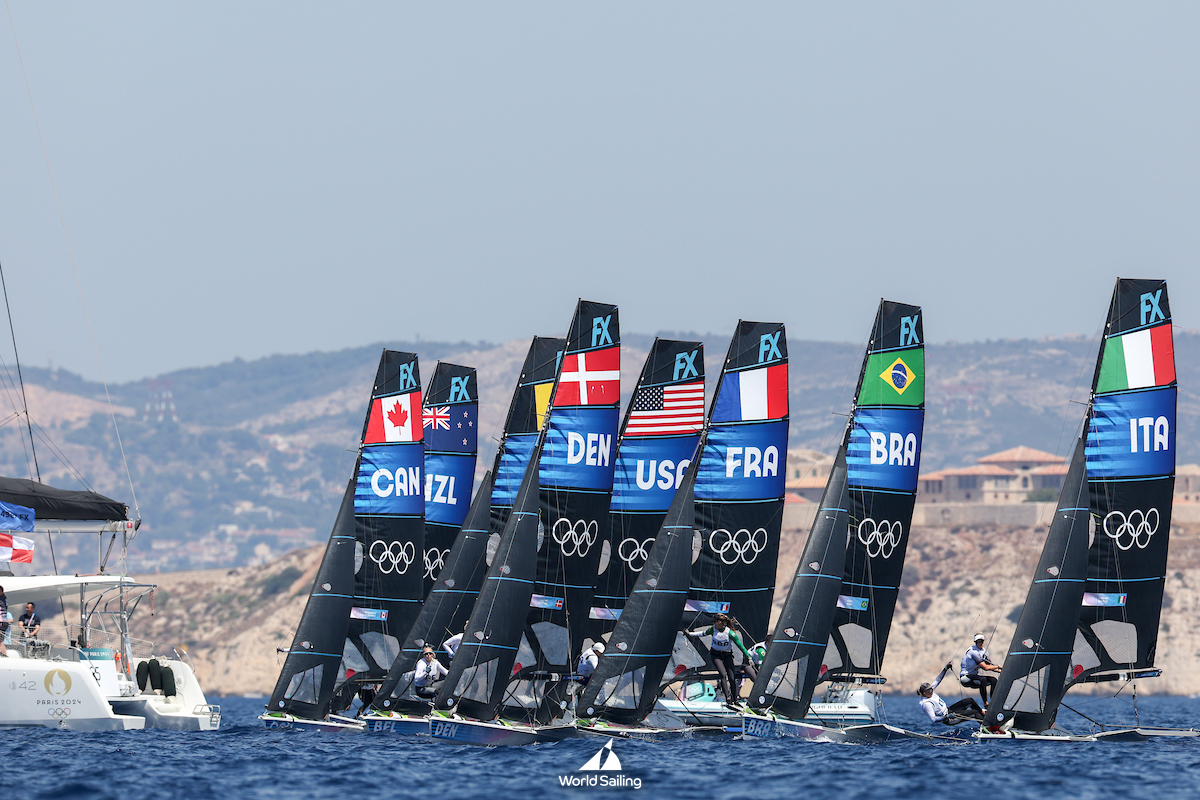| “After that we switched to focus on what we had to do. It was quite light so we knew the start would be a good thing to focus on.”
Steyaert said: “We are focused on what we have to do, race by race. That was the role of today.”
Bergmann said: “Going into today our main focus was to keep it simple and easy and focus on what we can do and I think we managed that quite well. We will take it day by day.
“Marla wakes up every morning and looks out the window and sees what she gets from the wind so we don’t get too excited about the forecast.”
Wille said: “We know that we’re fast in these conditions so we tried to have a free lane and play on our speed.”
The Australian pair had a solid start to the regatta after an up and down season… read on…
Olympic Sailing 2024: McHardie and McKenzie Give New Zealand the Perfect Start in Men’s Skiff
Isaac McHardie and William McKenzie launched their Olympic campaign with a win in the opening 49er race to take control of the Men’s Skiff.
The New Zealand pair followed that up with third in race two, which was enough to top the table at the end of the first day on the water.
Ireland’s Robert Dickson and Sean Waddilove started slower than the leaders, but recovered well to win the final race of the day and move within a point of the New Zealanders.
Uruguay’s Hernan Umpierre and Fernando Diz also started strong and their second placed finish in race two was enough to clinch third spot overall at the end of the day’s racing.
McHardie said: “It was good to get out there racing after a lot of build-up in Marseille. To have a good day out there is a bonus, so we’re happy.”
McKenzie said: “We generally like lighter conditions and when you throw in a few shifts here and there we quite like that as well. It was good to win and flush the nerves away.
“Everyone was very nervous going into the first race and to get a bullet in the first race is awesome, it’s a great feeling.”
Waddilove said: “Very tricky first two races so we’re really happy to come away with the results that we did today.
“We’ll get the boat away and make sure that it’s ready for tomorrow and get dinner with the rest of the team and just chat.”
Dickson said: “The first two races were pretty tricky. It was quite hard to see the breeze on the water because it was quite wavy and super light and sweaty. It was pretty tiring so we’re glad to get away with some nice results.”
Umpierre said: “We had two solid races at the beginning of the day and we ended with a not so good one, but we are happy with the results and we keep pushing.
“It was quite tricking to read what was going on with the next move, but I think we dealt with it quite well. There were just a few mistakes that we will learn from tomorrow.
“If you are in the front pack you need to cover them because they are all fast, so if we are in the front pack we need to stay there.”
The Irish skiff paif had a splendid start to their games, read on here…
As the American article noted, there was a massive fanbase to cheer the sailors out to the sea and then back home again. 12,000 tickets were sold each day, and by the looks of things that’s the number of fans who attended the fanzine on day 1. There was a display of each Olympic boat where fans could walk around an touch the equipment, there was a faux pirate ships where kids and adult kids could scale the masts and ring a bell at the top, there was a video presentation in the roof of a tent where the history of Olympic sailing was displayed, and there was a beach for fans to swim, lounge, and even try sailing. There were also misters, and some shade, but it was still a very hot day for all who attended, and without too much actual sailing to see. The Olympic Broadcasters planned to show the IQ Foil racing, and then were very slow to adjust to the reality of only skiffs racing. What could have been complete coverage of all six skiff races, starting on time, and without much if any delay ended up with only a single race broadcast on the day despite two choppers hovering for over four hours. Another missed opportunity for sailing media.
How it works:
Medals for the Women’s Skiff (49erFX) will be decided by the cumulative results of the 20-strong fleet over 12 races. The boat with the lowest total will rank first.
Athletes will be able to discard their worst finishing position after they’ve completed three races.
At the end of the Opening Series, the top ten boats in the fleet will qualify for the Medal Race, which is worth double points.
The score in the Medal Race cannot be discarded. The crew with the smallest overall points total will win gold.

|
